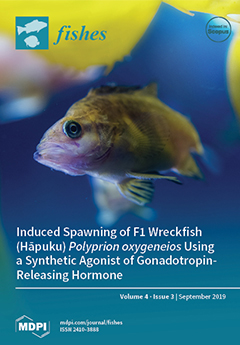Ages of margate,
Haemulon album (
n = 415) and black margate,
Anisotremus surinamensis (n = 130) were determined using sectioned sagittal otoliths collected from the Southeastern United States Atlantic coast from 1979 to 2017. Opaque zones were annular, forming between January and
[...] Read more.
Ages of margate,
Haemulon album (
n = 415) and black margate,
Anisotremus surinamensis (n = 130) were determined using sectioned sagittal otoliths collected from the Southeastern United States Atlantic coast from 1979 to 2017. Opaque zones were annular, forming between January and June for both species, with peaks in occurrence of otoliths with opaque margins in April for margate and March for black margate. The observed ages for margate were 0–22 years, and the largest fish measured 807 mm TL (total length). Black margate ranged in age from 3 to 17 years, and the largest fish was 641 mm TL. Weight–length relationships were: margate, ln(
W) = 2.88 ln(TL) − 10.44 (
n = 1327,
r2 = 0.97, MSE = 0.02), where
W is total weight (grams, g); black margate, ln(
W) = 3.02 ln(TL) − 11.10 (
n = 451,
r2 = 0.95, MSE = 0.01). Von Bertalanffy growth equations were
Lt = 731 (1 −
e−0.23(t+0.38)) for margate, and
Lt = 544 (1 −
e−0.13(t+2.61)) for black margate. After re-estimating black margate growth using a bias-correction procedure to account for the lack of younger fish, growth was described by the equation
Lt = 523 (1 −
e−0.18(t+0.0001)). Age-invariant estimates of natural mortality were M = 0.19 y
−1 and
M = 0.23 y
−1 for margate and black margate, respectively, while age-varying estimates of
M ranged from 2.93 −0.23 y
−1 for fish aged 0–22 for margate and 7.20 − 0.19 y
−1 for fish aged 0–18 for black margate. This study presents the first documentation of life-history parameters for margate from the Atlantic waters off the Southeastern United States, and the first published estimate of black margate life history parameters from any geographic region.
Full article





